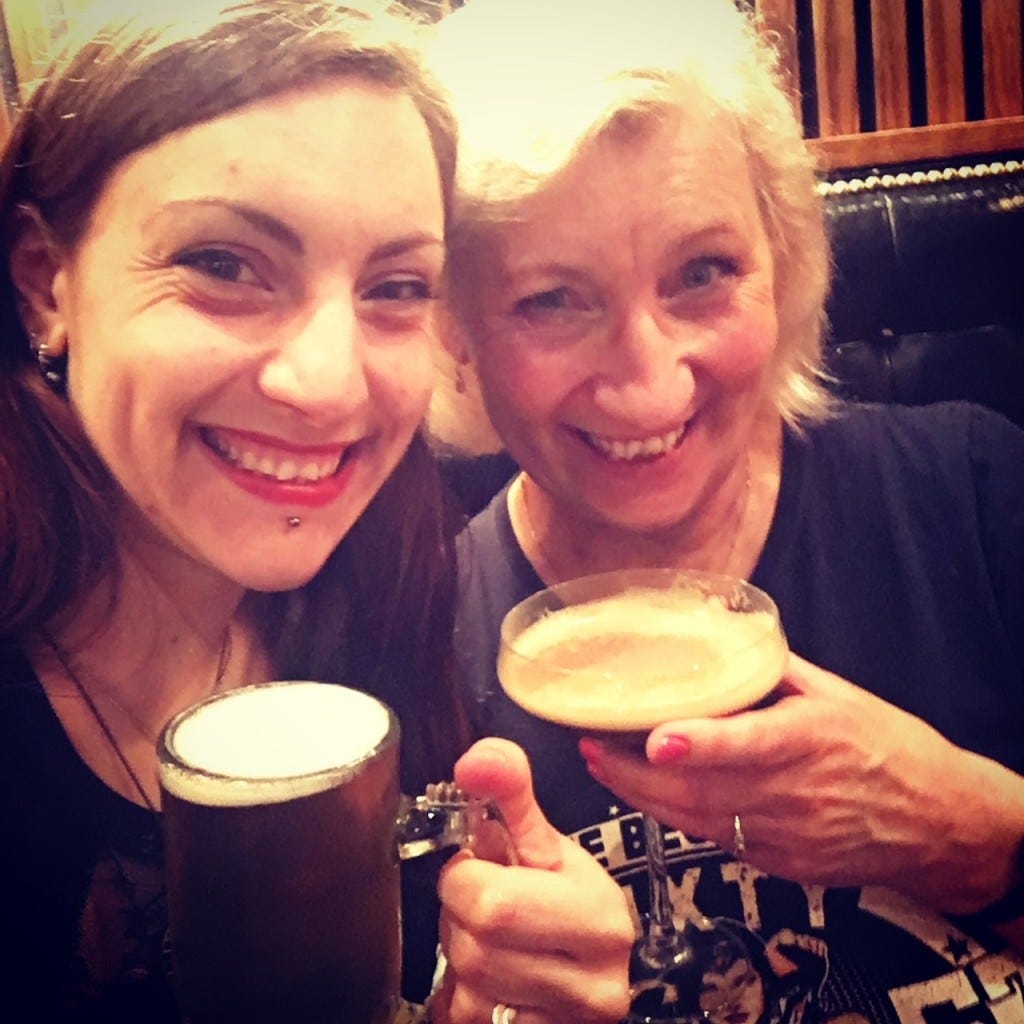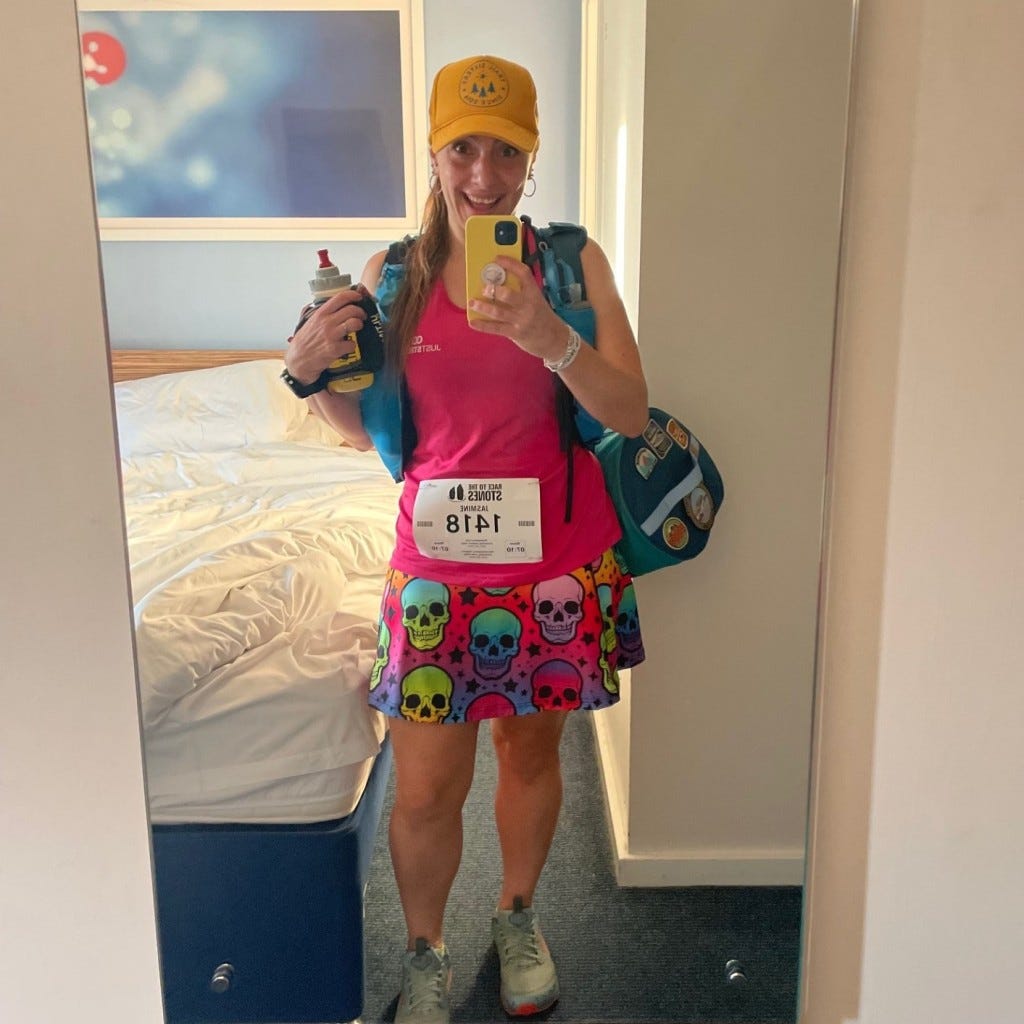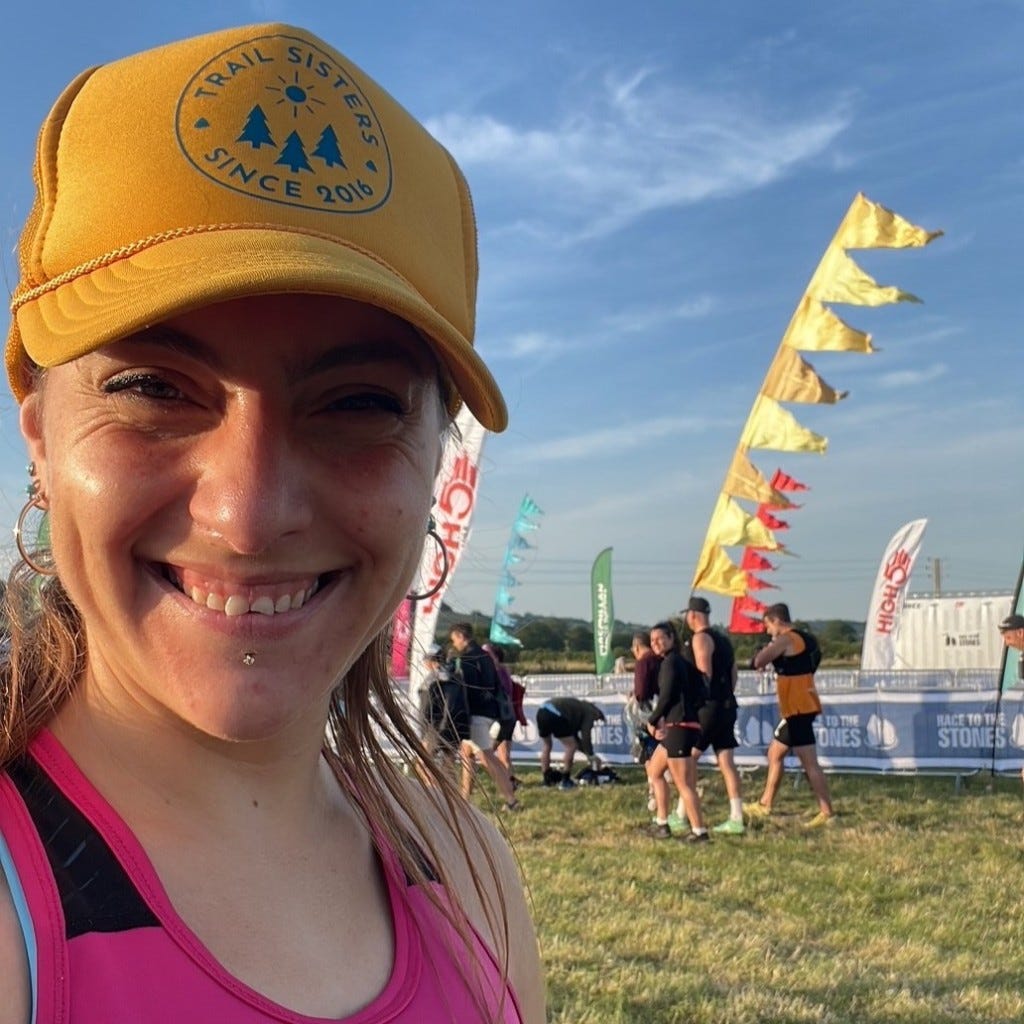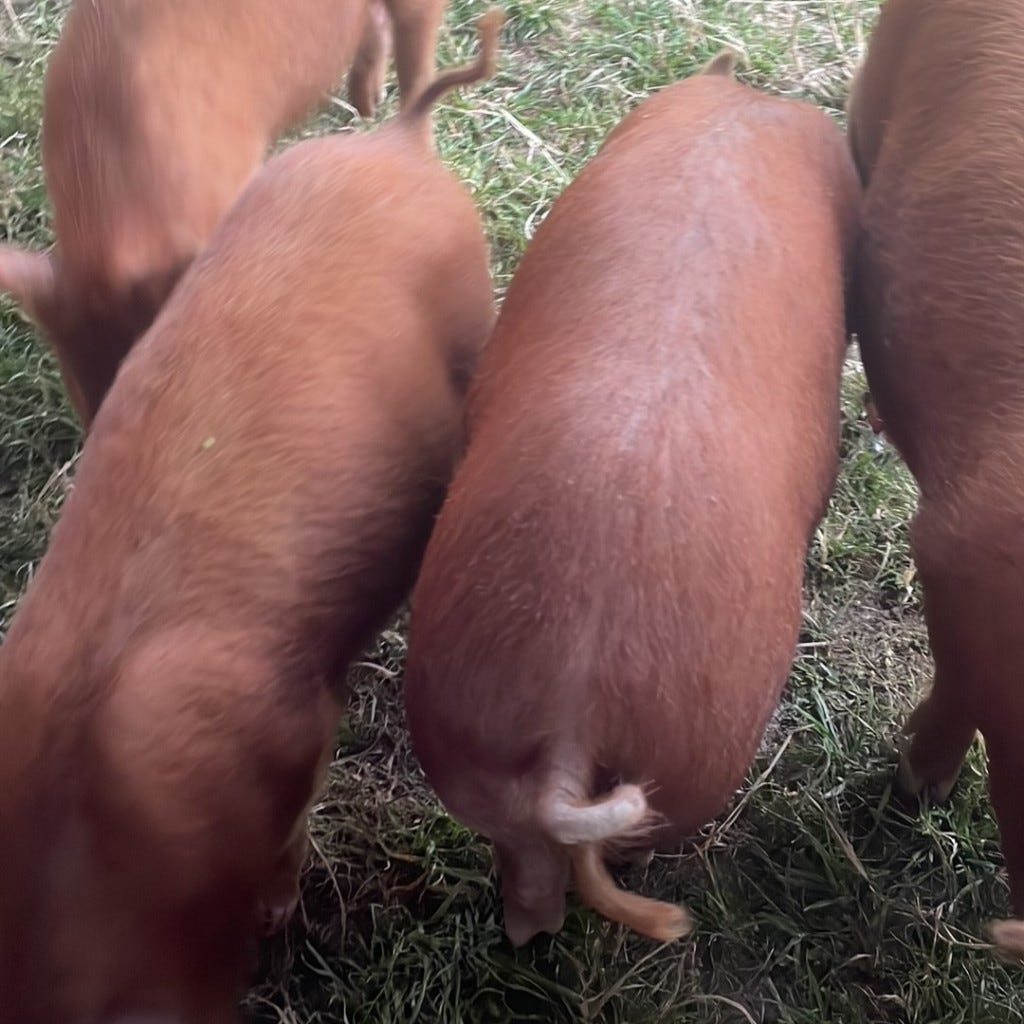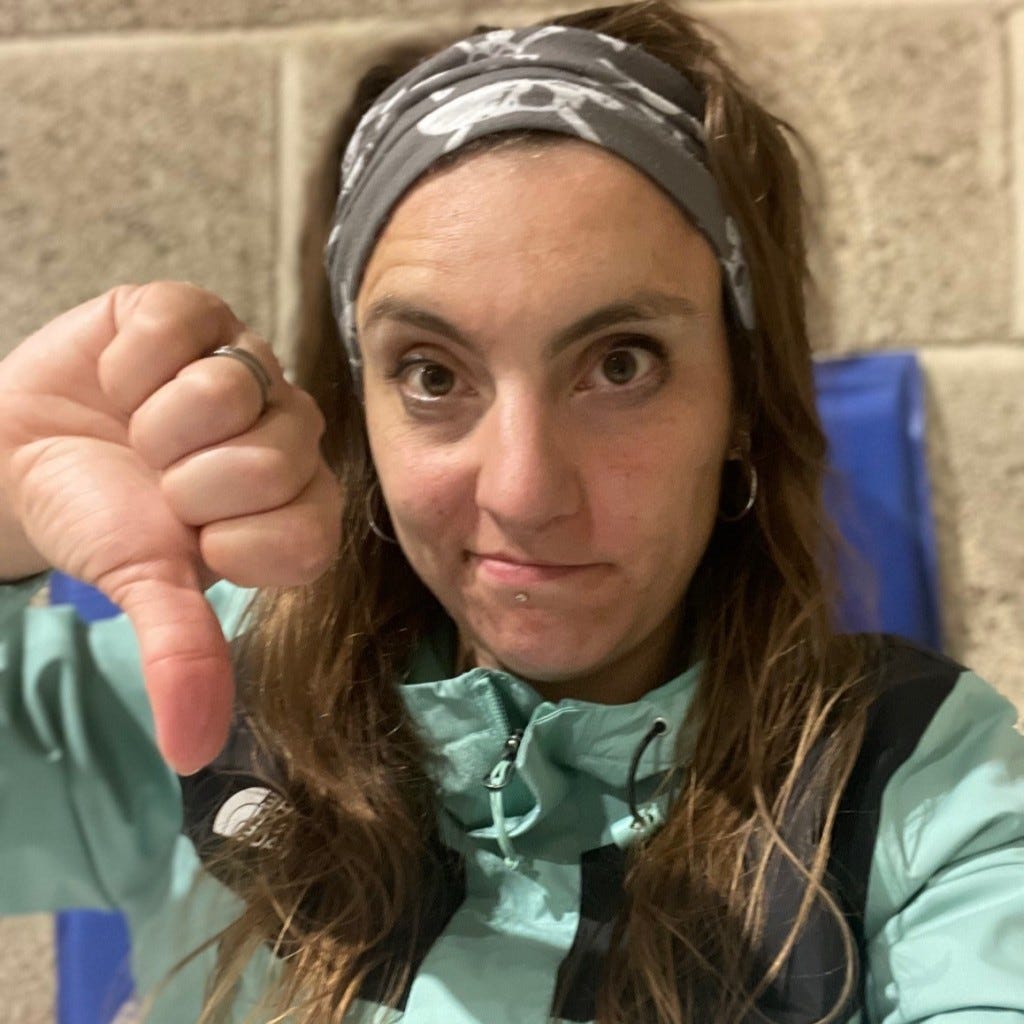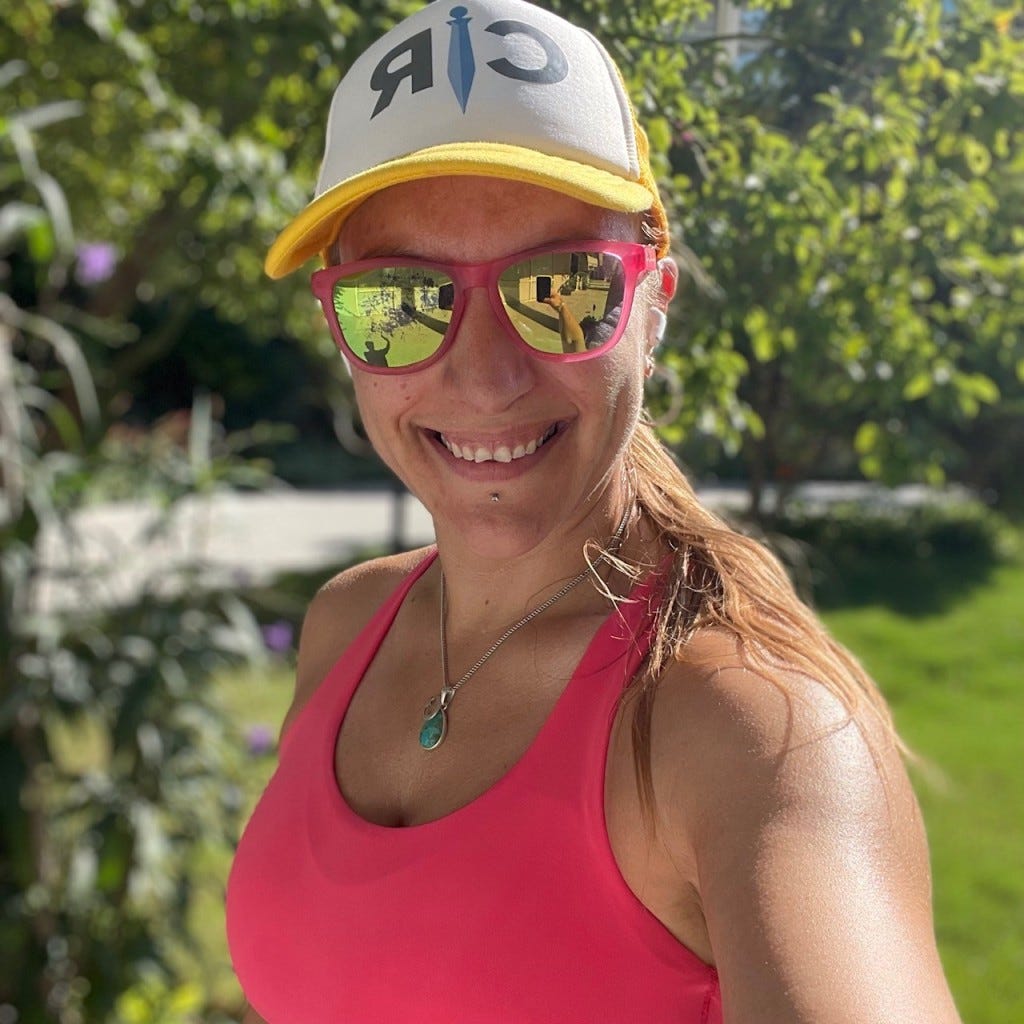The courage to fail
What happens when you train your legs for a 100km race, but not your mind?
After my South Downs Way 50 DNF in May 2023 I found myself looking down the barrel of an entry to the Autumn 100, my third attempt at the distance, and about to pull the trigger on my backup qualifier. Race to the Stones: 100k along the beloved and familiar Ridgeway in the height of summer with a generous cut off and few excuses. This was going to come down sheer bloody determination, and to courage.
Which brings to my mum.
As I’ve got older and wiser I have become increasingly aware of how courageous my livewire of a mum actually is. Baby Jaz, age 20, thought she was a billy big bollox for flying alone to a Morrissey concert in Dublin with £9.50 in her bank account and the address of a hostel written on her hand; baby mum did sort of the same thing, except it was a casino in North Cyprus, two bob and tuppence, and she ended up living there for 6 years. While I fretted about keeping my running streak through lockdown, at the same age mum had uprooted a young family, leaving behind her 3 bed semi and her Laura Ashley wallpaper and her Sky dish to live the Good Life in a whitewashed cottage with a mother in law with dementia and 8 hours of electricity a day. At age 39 I was beating myself up for failing to finish yet another Centurion race; when my mum was the same age a business dispute involved a guy taking a baseball bat to her head, whereupon she turned right around and gave it back to him. It is not easy to scare my mum.
But my mum's Achilles heel is driving at night and/or in bad weather; she is terrified of it. I knew this as I rang her from the Race to the Stones race HQ at 2am to ask for a lift home - a 4 hour round trip on a grim and stormy moonless night. I thought about the way she didn't even flinch when I asked her for help. And I thought long and hard about what a failure I was for registering myself a DNF with the race officials - a race I still had 12 fucking hours to finish - all because my nerve had abandoned me.
As I prepped my bag the night before - in a Travelodge inexplicably located on a roundabout like a JG Ballard nightmare - I mentally walked through my plan for the race, trying not to let panic overwhelm me. This would be the longest race attempt for a number of years; still though, I had a fighting chance this time. I had supercoach Eddie Sutton in my corner, I had a nutrition plan, I had a very generous cutoff, and I had a little printout of the course elevation, aid station locations, and photos of the cats.
Ah. I had no coffee. Bloody cheapskate Travelodge.
Like many others I came out of lockdown physically unscathed but with a fragile few threads of confidence; compared with how fearlessly I used to throw myself into ultra races and adventure challenges I now doubted I could hobble/hike a distance I regularly used to cover on a route I adored, and the lack of coffee sounded an ominous twang as another thread of confidence snapped. And that’s the frame of mind I started with: a bit excited, mostly terrified. You should be respectfully nervous at the start line of an ultra – as much as I talk about normalising the effort it’s still a bit insane to travel that far on foot – but in retrospect the balance of respect and terror was way off and that should have been a warning sign. Nonetheless, I took off through the starting arch at Lewknor with the 07:10 wave, my GPS route set for Avebury, and immediately felt my legs go stone dead.
My plan had been to run 3 miles and walk 1, and eat in the walk breaks – something I’d practiced but never executed in a race before. Fairly quickly I fell in with a good group of people and was chatting away happily, getting to the root of a good conversation the way you only can when you’re side by side on a trail, when my watch buzzed to tell me I was three miles in. Haunted by idea of blowing up early like I did on the South Downs Way 50 I let them go on, and with them the chance of companionship and distraction. It would turn out to be a terrible call, and a good example of why having a plan is important on an ultra, but being able to adapt much more so.
So yeah. Quelle surprise, alone and not focusing, I took a wrong turn within the hour and earned myself a bonus mile. Not a disaster or even unusual – and yet I almost burst into tears. This was attritional already and I wasn’t even in double digits yet. The ombre sky and the summer morning haze were picturesque but difficult to enjoy while my mind ran through all the ways in which I hated everything. Common race experiences were presenting as catastrophes, energy wasted on panic. This is not what it’s meant to be about.
My first coffee of the day at pit stop 1 brought a brief boost – more than likely just restoring the proper ratio of coffee to blood, I am Turkish Cypriot after all – and shortly afterwards I fell in step with another first time runner doing the 100k straight through. As we chatted about life, the universe and everything another 20 miles slipped by. No fear, no panic, only fleeting pangs of doubt as the temperature continued to soar and the power of companionship. Although I had by now let a couple of nutrition reminders pass unheeded, we kept moving steadily together as far as halfway. Settling into the rest area, we planned on a maximum 30 minute pitstop to recharge phones, bellies and supplies. I admired my jacket potato and thought about how nice it would be if I could have eaten it.
And this is where my second biggest mistake of the day came in. Not having arranged where to meet at the end of the break and not feeling confident enough to go back out by myself, I waited for her at the restart banner for another half hour, in vain. I want to say I don’t know why I, a runner of ten years’ ultra experience, did this, but the truth is I know exactly why. My walk-run plan had collapsed. My eating schedule had collapsed. My self-belief had collapsed. In preparation for endurance sports you need to train not just your body but your mind as well, and in that moment I realised I had neglected my already most-neglected body part.
By the time I reached the pitstop just before 60k a humdinger of a storm landed, and with a woeful lack of calories to compensate my body temperature plummeted and I nearly fainted. No amount of forcing ready salted crisps against my numb mouth would help. This again. This insanity again. I know that if I eat I’ll be able to move; and yet nothing is more horrifying than the thought of eating once you’ve reached that point. I sat in the medical tent for almost an hour wrapped in a foil blanket and watching wild pigs hoover up crumbs. The DNF bus swung by and gave us exactly one chance to decide whether or not to get on board. As I dithered the driver, correctly judging that I would be physically able to carry on if I got some food in me, remarked that there was still almost a day left before the cutoff. Which was completely true, and kind of obvious when put that way. I’m so grateful that they didn’t make it easy to pull out just then; there was no second call. I HAD to keep trying.
As is often the case in ultra races, some angels appeared just when they were most needed. These ones were from Flyers Southend, as cheerful and kind a bunch of people you will ever bump into who readily agreed to let me join them for the next 8 miles. As the storm cleared a heavy dusk drew in and out came the headtorches. After braving the heat, the nausea, the cold and the hail, my next challenge was the dark; in preparation for this I’d done a nighttime marathon the month before, knowing that it was far from my favourite conditions to run in. The question was, would my nerve hold out now?
As the miles passed with no hope of food getting past my lips I focused purely on getting to the pit stop. No thinking of the 30km still to go after that, or the hours on feet, or the hills. My legs were jelly at this point, my stomach turning somersaults and my brain long since checked out of the race. When I finally landed in a plastic chair one of the aid station volunteers made me a crisp sandwich (salt, carbs, texture – trust me) and reassured me that I could take as long as I wanted. I cuddled it for ten minutes.
And then I broke out in sobs. Big, messy, childlike sobs. I wanted my mum. I wanted out.
In retrospect – and knowing that the next section was long, exposed and remote – it was probably the right call not to continue; you have to know when you’re putting others at risk as well as yourself. If I hadn’t been so familiar with the route would I have carried on and, having no other choice, somehow made it to the final stop? Possibly, if I had trained my fortitude as much as my legs or been able to eat that sandwich instead of clutching it like a dead pet. At the time though I knew my bravery had long since deserted me, if it had made it to the start line at all. Then again, I thought, Everest is littered with the remains of the brave.
So there I am, back at the beginning of this tale, curled up in a barn at the finish line while my mum battles her perfect storm of intense darkness, country roads and awful weather to rescue me. She will say that when her children (I’m 40 but I’m still her child) needs her then fear becomes irrelevant. I say that fortitude comes with practice.
I’m not telling you this story to put you off ultrarunning or any sort of endurance adventure; far from it, I strongly believe that the more you experience getting into and out of challenging situations the more prepared you’ll be for, well, life. It’s deeply satisfying to look back on an elevation chart, or pace splits, or even backwards at the expanse of terrain already covered, and think “I did that. What else can I do?” just as it is deeply satisfying to crack a tough problem at work, or master Through the Fire and Flames on guitar. But to get to “I did that” you usually start with “Can I do that?”. You plot the steps between the two, what you need to do to reach each one, what tiny hop of faith carries you between them. And that was the one crucial element I missed: faith in myself.
If I can take one positive from this experience, is that the best possible post-ultra recovery for those who can afford it is an all-inclusive week by a swimming pool on the south coast of Turkey. I ate my body weight in buffet food, floated from one swim-up bar to the next, and read a book a day.
And when I got home, I pulled out of the Autumn 100 with absolutely no compunction. Eddie had worked miracles with my physical state, but the mental fitness still had a long way to go. We would practice the scary things. We would practice the uncomfortable things. We would practice the attritional things. That’s what my mum would do.
Fail. Fail again. Fail better.
And in the meantime, find another 100km…




